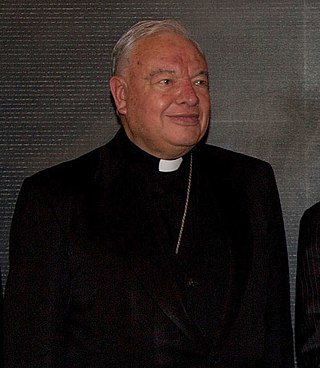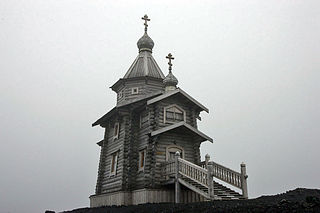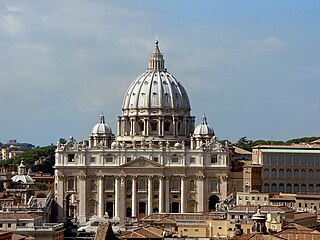
Joseph Zen Ze-kiun, SDB is a retired Chinese cardinal of the Catholic Church who served as Bishop of Hong Kong from 2002 to 2009. He was made a cardinal by Pope Benedict XVI in 2006 and has been outspoken on issues regarding human rights, political freedom, and religious liberty.

Raymond Leo Burke is an American prelate of the Catholic Church. He is a bishop and a cardinal, and was a patron of the Sovereign Military Order of Malta from 2014 to 2023. He led the Archdiocese of St. Louis from 2004 to 2008 and the Diocese of La Crosse from 1995 to 2004. From 2008 to 2014, he was the prefect of the Supreme Tribunal of the Apostolic Signatura.

Juan Sandoval Íñiguez is a Mexican retired prelate of the Catholic Church who served as the Archbishop of Guadalajara from 1994 to 2011. He was made a cardinal by Pope John Paul II in 1994.

Pope Francis is the head of the Catholic Church, the bishop of Rome and sovereign of the Vatican City State. He is the only pope to be a member of the Society of Jesus (Jesuits), the only one from the Americas, the only one from the Southern Hemisphere, and the only one born or raised outside Europe since the 8th-century papacy of the Syrian Pope Gregory III.

Reinhard Marx is a German cardinal of the Catholic Church. He serves as the Archbishop of Munich and Freising. Pope Benedict XVI elevated Marx to the cardinalate in a consistory in 2010.

Christianity in the 21st century is characterized by the pursuit of church unity and the continued resistance to persecution and secularization.

Athanasius Schneider, O.R.C. is a Catholic prelate, serving as the Auxiliary Bishop of Astana in Kazakhstan. He is a member of the Canons Regular of the Holy Cross of Coimbra. He is known for championing the pre-Vatican II liturgical traditions and practices of the Church and for protesting certain current policies, including some associated with Pope Francis.

Lorenzo Baldisseri is an Italian prelate of the Catholic Church who served as Secretary General of the Synod of Bishops from 21 September 2013 until 15 September 2020. He was made a cardinal in 2014. He previously served as Secretary of the Congregation for Bishops after more than twenty years in the diplomatic service of the Holy See that included stints as Apostolic Nuncio to Haiti, Paraguay, India, Nepal, and Brazil.
In the Catholic Church, the Synod of Bishops, considered as an advisory body for the pope, is one of the ways in which the bishops render cooperative assistance to him in exercising his office. It is described in the 1983 Code of Canon Law as "a group of bishops who have been chosen from different regions of the world and meet at fixed times to foster closer unity between the Roman Pontiff and bishops, to assist the Roman Pontiff with their counsel in the preservation and growth of faith and morals and in the observance and strengthening of ecclesiastical discipline, and to consider questions pertaining to the activity of the Church in the world."

The Third Extraordinary General Assembly of the Synod of Bishops, the first of two synods popularly referred to as the Synod on the Family, was held in Vatican City on 5–19 October 2014 on the topic of Pastoral Challenges of the Family in the Context of Evangelization. The Synod was a gathering of 253 bishops and other participants in preparation for a larger synod with the same theme in October 2015. The participants discussed problems facing the family today, including the effects of war, immigration, domestic violence, sexual orientation, polygamy, inter-religious marriages, cohabitation, the breakdown of marriage, and divorce and remarriage. In particular, the synod was marked by debate regarding the pastoral care of Catholics living in "irregular unions", including those civilly remarried after divorce, unmarried cohabitating couples, and especially gay Catholics. The synod was also noted for a new prominence of African bishops.

The Fourteenth Ordinary General Assembly of the Synod of Bishops, popularly referred to as the Synod on the Family, took place from 4 to 25 October 2015 with the theme of "the vocation and mission of the family in the Church and in the contemporary world." It was "reflect[ing] further on the points discussed" at the 2014 Third Extraordinary General Assembly of the Synod of Bishops "so as to formulate appropriate pastoral guidelines" for the pastoral care of the person and the family. The 2014 assembly of the synod, called to define the status quaestionis and to collect the participants' experiences and proposals, can be understood as a preparation for the 2015 assembly, but they are meant to "form a single organic unity." It took place in the Synod Hall in the Paul VI Audience Hall in Vatican City.
Amoris laetitia is a post-synodal apostolic exhortation by Pope Francis addressing the pastoral care of families. Dated 19 March 2016, it was released on 8 April 2016. It follows the Synods on the Family held in 2014 and 2015.

The 15th Ordinary General Assembly of the Synod of Bishops, commonly referred to as the Synod on Young People, is a Roman Catholic synod that took place 3–28 October 2018 and had as its theme "Young People, Faith, and Vocational Discernment". Its aim was to "accompany young people on their way of life towards maturity so that, through a process of discernment, they can discover their life project and realize it with joy, opening the encounter with God and with men, and actively participating in the building up of the Church and society".

Mario Grech is a Maltese prelate of the Catholic Church who was Bishop of Gozo from 2005 to 2019. He was Pro-Secretary General of the Synod of Bishops from October 2019 until he became Secretary General in September 2020.
The Synod of Bishops for the Pan-Amazon region, commonly referred to as the Amazon synod, met in Rome from 6 to 27 October 2019. Pope Francis announced on 15 October 2017 that a special assembly of the Synod of Bishops would work "to identify new paths for the evangelization of God's people in that region", specifically the indigenous peoples who are "often forgotten and without the prospect of a serene future".
Praedicate evangelium is an apostolic constitution reforming the Roman Curia and was published and promulgated on 19 March 2022 by Pope Francis; the document took effect on 5 June 2022.
Querida Amazonia is a 2020 post-synodal apostolic exhortation of Pope Francis, written in response to the Synod of Bishops for the Pan-Amazon region held in Rome in October 2019. Focusing on the Amazon region of South America, it is addressed "to the people of God and to all persons of good will". The document is dated 2 February 2020, the liturgical feast of Candlemas, and was released by the Holy See Press Office at a press conference on 12 February.

Nathalie Becquart, XMCJ is a French Catholic religious sister and member of the Congregation of Xavières. She was appointed a consultor to the Synod of Bishops of the Catholic Church in 2019 and named one of its undersecretaries in 2021. From 2008 to 2018 she oversaw the National Service for the Evangelization of Young People and for Vocations (SNEJV) within the Bishops' Conference of France.

The Synodal Way was a series of conferences of the Catholic Church in Germany to discuss a range of contemporary religious, spiritual and theological and organizational questions concerning the Catholic Church, as well as gender issues and possible reactions to the sexual abuse crisis in the Catholic Church in Germany.
Events in the year 2023 in Vatican City.













